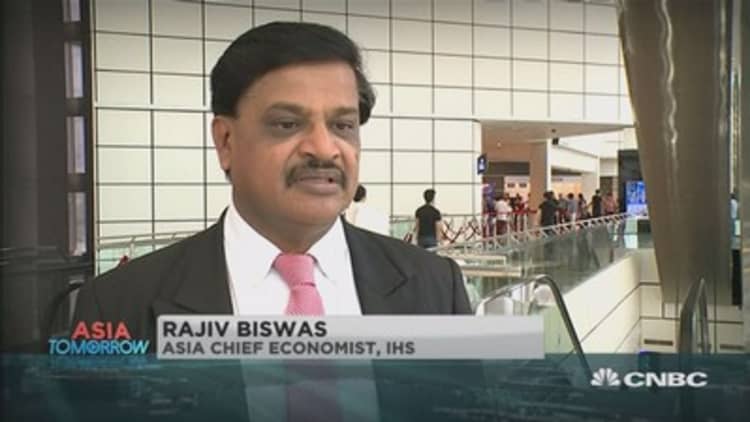Despite the upbeat national mood ahead of Singapore's 50th birthday celebrations next month, economic sentiment is souring in the city-state, with analysts dramatically downgrading full-year gross domestic product (GDP) forecasts.
DBS, Southeast Asia's biggest lender by assets, now expects a 2.4 percent expansion in 2015, from 3.2 percent previously forecast. That would mark Singapore's slowest growth since the global financial crisis, the bank said in a report last week.
IMA Asia is even more bearish, calling for 1.9 percent growth, down from a previous 2.4 percent forecast.
In comparison, the government's forecast is for a 2-4 percent expansion this year , on top of 2.8 percent growth in 2014.
The downgrades precede Tuesday's release of official advance GDP estimates for the April-June quarter. Consensus opinion is for a 2.7 percent annualized increase, according to a central bank survey in June, a tad better than the first quarter's 2.6 percent expansion. But even that is too optimistic, argued Citi economist Wei Zheng Kit. He's only expecting a 1.7 annual boost for the second-quarter, citing broad-based weakness across the economy.
Key factors at play
Manufacturing remains Singapore's biggest risk, warned Vishnu Varathan, senior economist at Mizuho Bank. "Recent purchasing manager's index (PMI) surveys have remained above the key boom-or-bust 50 level, but just barely."
Tepid output is underscored by the absence of a recovery in exports due to poor global demand, he explained, and sentiment could remain dire amid fears over Greece leaving the euro zone and the mainland's recent equity market massacre.
Read MoreSingapore's giant wealth fund still bullish on China
In May, non-oil domestic exports fell 0.2 percent on year, slowing from a 2.2 percent increase in April. Singapore's economy is highly exposed to the global business cycle as a result of its vast trade and investment links, so external issues have a sizeable impact on the wealthy city-state.
Moreover, the domestic labor crunch is a key impediment to growth, particularly for the service sector, said DBS economist Irvin Seah, referring to recent foreign manpower restrictions.
"While unemployment is already below the natural rate of 2 percent, and job vacancies have been rising, Singapore's employment shrank for the first time in nearly six years in 1Q15, driven mainly by a sharp moderation in service employment and a continued decline in manufacturing employment," he said in a Thursday report.

Meanwhile, a widening difference between the economy's actual output and its potential output, known as the negative output gap, is also worrisome, Seah added.
"Slack in the economy has already pushed May core inflation to near zero at 0.1 percent on year [a new five-year low]. This decline in core inflation goes hand-in-hand with the widening negative output gap, both of which underscore the deceleration in growth."
Construction in focus
For IMA Asia, the worsening outlook for construction was a key trigger to its growth downgrade. A larger than expected fall in the value of construction contracts awarded (both private and public) in recent months was worrying, explained economist Kostas Panagiotou.
"We normally follow contracts awarded on a 12-month rolling basis as monthly contracts are too volatile. Private contracts have been falling a lot faster than public ones, reflecting the extent of the housing decline."
Read MoreHave Singapore's luxury homes hit rock bottom?
Home prices have declined for seven straight quarters, the longest losing streak in over a decade, as a result of stringent government curbs introduced in 2009 to cool frothy prices.
Private construction contracts have slumped 34 percent from mid-2011 to April this year, while public contracts are down 17 percent since August 2014, according to IMA Asia. The latter's fall is particularly surprising since the government has announced plans to increase infrastructure capacity, such as building an additional airport terminal, Panagiotou noted.
Chances for stimulus
Despite the bevy of poor data prints, Citi says they still remain insufficient to trigger a move from the Monetary Authority of Singapore (MAS), the country's central bank. MAS, which employs the currency rather than interest rates to manage monetary policy, traditionally holds two reviews twice a year but jumped on the global easing bandwagon in January in a surprise move.
Citi warns that it will be keeping a close eye on the second-quarter employment report due at the of July for signs of further weakness, which could sway the central bank.

